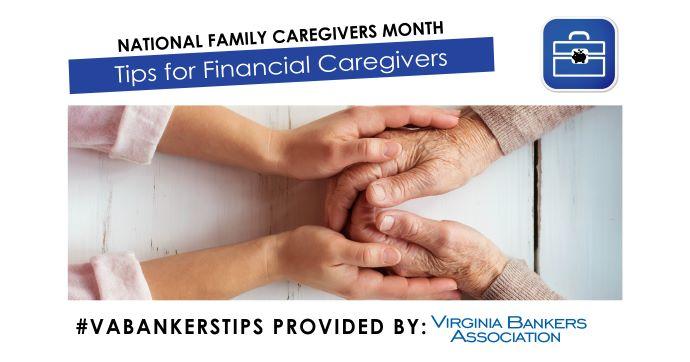Virginia Bankers Recognize National Family Caregiver Month with Tips for Financial Caregivers
In recognition of National Family Caregiver Month in November, Virginia bankers are helping financial caregivers better understand and execute their roles. The Caregiver Action Network (the National Family Caregivers Association) began promoting national recognition of family caregivers in 1994. Nearly 44 million Americans are providing care to an individual suffering from illness, disability, limited mobility or age. A financial caregiver is a person who helps a senior manage his or her financial life. The relationship evolves as the needs change. Initially, a caregiver assists with everyday financial matters, but the role can involve greater responsibility if the senior becomes ill or injured or has trouble managing money.
“Financial caregivers play an important role in ensuring that all finances — from routine to complex — are managed wisely, helping their loved ones maintain the best quality of life possible,” said Bruce Whitehurst, president and CEO of the Virginia Bankers Association. “Each relationship is unique, but no matter how the role is designated, it’s extremely important for financial caregivers to learn their legal responsibilities and stay up to date on any changes in laws that may affect their duties.”
Virginia bankers offer the following tips to help individuals understand their role as financial caregivers:
- Learn the rights and restrictions that apply to your role. Financial caregivers are fiduciaries with a duty to act and make decisions on their loved one’s behalf. Learn the legal implementations of your assigned authority in order to better facilitate your role.
- Manage money and other assets wisely. Financial caregivers may be in charge of daily, unexpected and future expenses their loved ones may incur. Especially if the beneficiary has a fixed income or limited finances, it is extremely important that caregivers minimize unnecessary costs and budget accordingly to ensure that all money is properly allocated.
- Recognize danger signs. Seniors have become major targets for financial abuse and fraud. Make sure to stay alert to signs of scams or identity theft that may put your loved one’s assets in peril.
- Keep careful records. When acting as a financial agent, proper documentation is not only encouraged but required. Make sure you keep well-organized financial records, including up-to date lists of assets and debts and a streamline of all financial transactions.
- Stay informed. Monitor changes in financial status of the beneficiary and take appropriate action, as needed. Also, be sure to stay up to date on changes in the laws affecting seniors.
- Seek professional advice. Consult a banker or other professional advisors when you’re not sure what to do.
In addition, Virginia bankers provide an explanation of the various roles and responsibilities of three types of financial caregivers: power of attorney, trustee and federal benefits fiduciary.
Understanding your role as a power of attorney.
- Power of attorney is designated by your loved one and gives you the authority to act and make decisions on their behalf, including managing and having access to their bank and other financial accounts. Authority continues if your loved one becomes incapacitated and ends when power is revoked or your loved one dies.
Understanding your role as a trustee.
- Authority is given once you are named as trustee or co-trustee of a revocable living trust. As a trustee, your authority applies only to the property noted in the trust, authorizing you to protect, manage and distribute the trust’s assets as directed in the trust document. Authority continues after the death of the trust creator or grantor.
Understanding your role as a federal benefits fiduciary.
- A federal benefits fiduciary is appointed to accept and delegate federal government benefit payments, such as Social Security and Veterans Affairs benefits, in the beneficiary’s best interest. Funds for the beneficiary are received through an account set up solely for this purpose. As a representative payee for Social Security benefits or a VA fiduciary for VA benefits, you are required to keep detailed records of all transactions related to the beneficiary and file annual reports detailing how benefits were used.
National Family Caregivers Month is a time to recognize and honor family caregivers across the country and Virginia bankers are ready to help. Financial caregivers should reach out to their bankers for assistance in their roles. Banks can review bank or credit card statements, answer questions about financial matters and assist in handling financial accounts.
# # #
About the Virginia Bankers Association
The Virginia Bankers Association represents banks of all sizes and charters and has served as the unified voice for Virginia’s $615 billion banking industry and its 42 thousand employees since 1893. To learn more about the VBA, click here.

